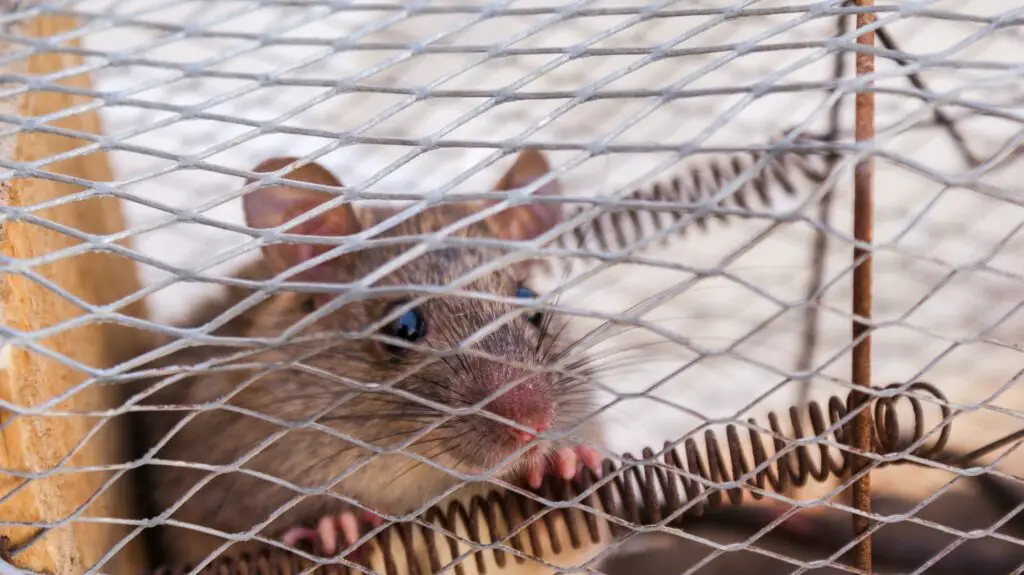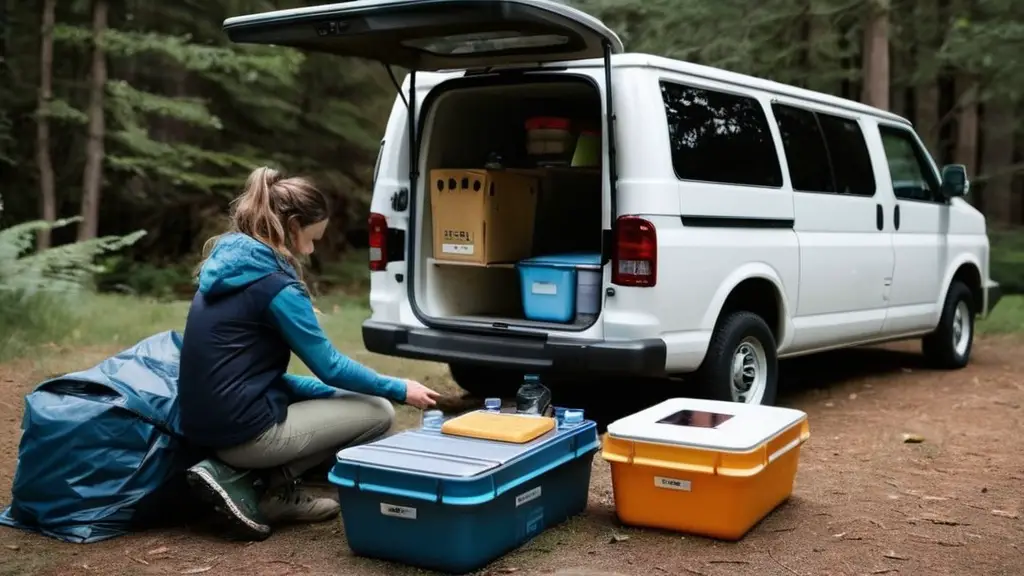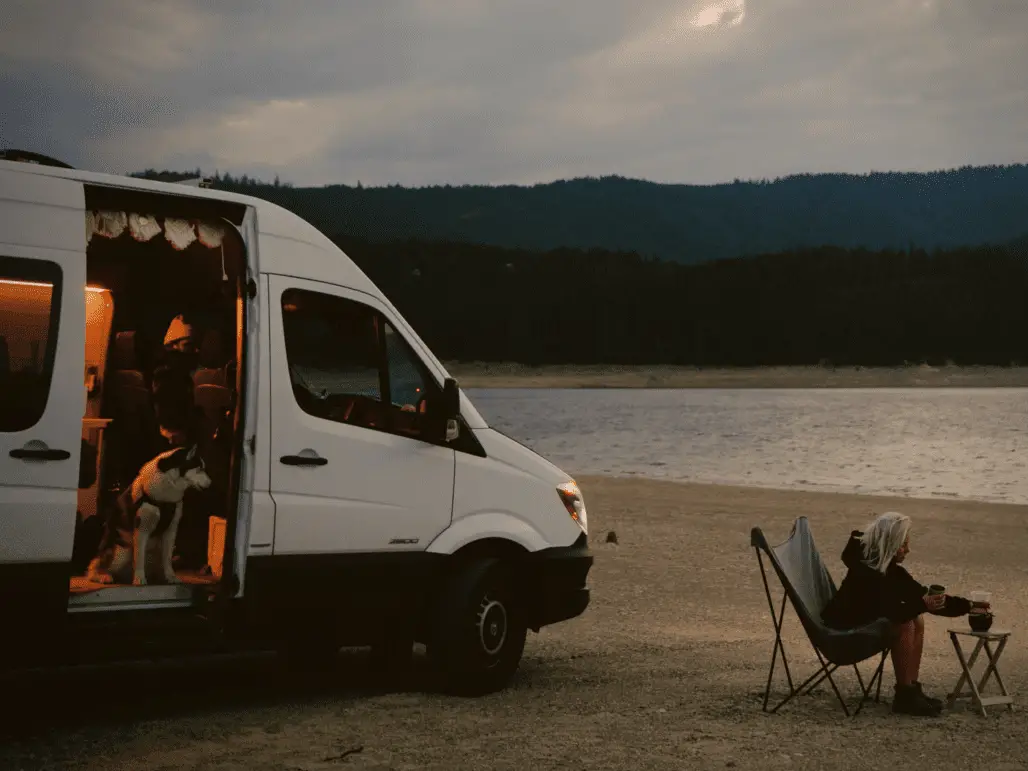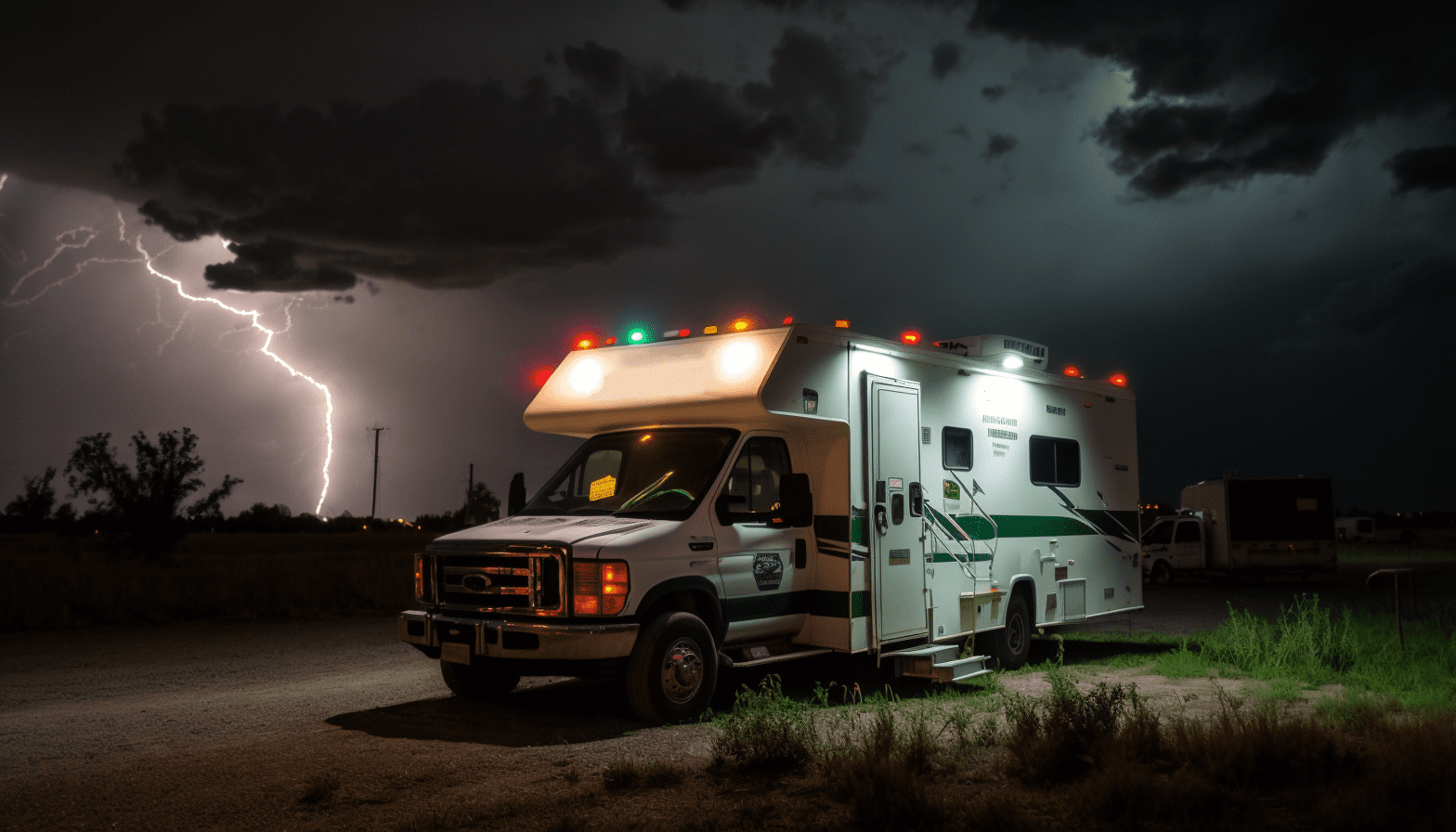I remember when we were converting the Big Pig ambulance, I found the mummified remains of a mouse in the ceiling insulation. It kind of explained why there were so many D-Con boxes in the storage compartments when we bought it. The mice had left a pretty big mess behind.
Mice can be a real nuisance when camping. They love to sneak in and make themselves at home, munch on whatever food they can find, and spread disease wherever they go. But not anymore! Well, I’m here to show you how to keep mice out of your camper for good. With just a few simple steps, you’ll be able to enjoy the freedom of camping without worry or hassle from uninvited guests.
Camping is one of life’s greatest joys – being surrounded by nature with no worries or cares. Unfortunately, this kind of peace has been disrupted by tiny intruders – mice! They’re determined little critters that will stop at nothing until they’ve made their way inside your camper and wreaked havoc on everything you own. Don’t let them ruin your next adventure – follow these tips to send those rodents packing!
This article will provide all the information you need to protect yourself and your possessions while enjoying time away from it all. You’ll learn what materials are necessary to keep the mice out, as well as a few preventive measures you can take before leaving campers unattended. So don’t wait any longer: read on to ensure your next adventure is mouse-free!
This post may contain affiliate links or mention our own products, please check out our disclosure policy here.
Table of Contents
Common Signs Of Mice Infestation
Now that you understand the definition of a camper, it’s important to know what common signs indicate an infestation. Mice can be very sneaky and difficult to detect; however, there are certain telltale signs you should look for. The first sign is mouse droppings. These small pellets are usually found near food sources or along walls and baseboards in your camper. Another thing to watch out for is gnawed holes in boxes or bags of food. You may also find shredded material such as fabric or paper being used as nesting materials around the camper. Finally, if you hear scrabbling sounds coming from dark corners or behind cabinets, this could indicate a mouse infestation as well.
Fortunately, there are several preventative measures that can help keep mice away from campers. Placing traps strategically around the perimeter of your camper is an effective way to catch any unwanted rodents before they get inside. Additionally, making sure all openings and cracks on the exterior of your camper are sealed tightly will help deter future intrusions from mice looking to make their home within your space. Taking these steps now can save you time and money down the road when it comes to dealing with a potential mouse infestation.
Prevention Techniques
Did you know that mice can squeeze through spaces as small as a dime? That’s why it’s important to take proactive measures to keep them out of your camper. Here are some prevention techniques to help make sure your campground stays mouse-free.
One great way to discourage mice is by using dryer sheets around the perimeter of your camper. Mice dislike the smell, and won’t come near it. You can also place paper towels soaked in peppermint oil at certain spots around the outside of the camper – this will repel any potential rodent visitors. Finally, try stuffing steel wool into any cracks or crevices they may be able to squeeze their tiny bodies through; its rough texture makes an unwelcome barrier for little critters looking for a cozy home!
These simple steps can make all the difference when trying to keep rodents away from your campsite. However, keeping cleanliness top of mind is just as important in deterring pests.
Cleanliness As A Deterrent
The next step in preventing mice from entering your camper is maintaining a clean environment. Keeping surfaces and floors clear of crumbs, trash, and other debris will make it difficult for rodents to find food sources inside the camper. Additionally, using products like Fresh Cab or Irish Spring can help keep their presence away by creating an unpleasant scent. Moreover, peppermint oil has also been known to deter mice due to its strong aroma. By cleaning regularly and utilizing these deterrents, mice may be less likely to enter the camper in search of sustenance.
In addition to reducing possible food sources, properly stored items are key when trying to prevent mouse infestations. Storing items such as clothes and linens off the floor in sealed containers will reduce potential nesting sites that could attract rodents over time. It’s also important to check any areas where water supply lines enter the camper for cracks or gaps that can allow entry by small animals. Sealing up all potential points of entry is another effective way of keeping mice out of campers for good.
Sealing Potential Entry Points
Securing your camper against rodent invasions is as critical to a successful camping trip as any other factor. Keeping mice out requires the right materials, tools and technique – all of which I’ll discuss here today.
The first step in keeping rodents away from your camper is sealing off potential entry points. Mice can squeeze through even the smallest cracks or crevices, so it’s important to inspect around windows, doors, vents, pipes and wires for possible openings. Caulk works well but spray foam insulation provides an extra layer of protection. Additionally, you can fill larger holes with plastic containers or copper wool mesh.
When done correctly, this process will effectively keep mice out of your camper by blocking their access into the interior space. However, if there are already signs of an infestation inside then setting traps and bait stations may be necessary for complete eradication…
Setting Traps And Bait Stations
Setting traps and bait stations is a key step in keeping mice out of campers. Mouse traps are the most effective way to catching mice, but it’s important to remember that they can also be dangerous if not set correctly. Bait stations provide an alternative solution which allows you to place poison bait without risking contact with yourself or your family. The best bait for mouse traps are peanut butter and cheese, while poison bait should ideally contain bromethalin as its active ingredient; both types should be replaced every few weeks.

In addition to setting up baits and traps, make sure the area around your camper is clear of debris that could attract rodents – this includes wood piles, trash cans, pet food, bird feeders etc. Once these steps have been completed, all that’s left is monitoring them regularly for signs of activity and resetting them when necessary.
To move on from here, repellents and natural predators offer another layer of protection against potential infestations.
Repellents And Natural Predators
Now that we have discussed trapping and baiting strategies, let us move on to other methods of keeping mice out of campers. Repellents and natural predators are two effective tools for rodent control.
Repellents can come in the form of sprays, granules or electronic devices. Some popular repellent products include peppermint oil spray, botanical rodent repellent, and ultrasonic device emitters. They work by making a space unpleasant for rodents to inhabit by creating an intimidating odor or sound.
Natural predators such as owls, snakes, cats and foxes do not need any preparation before they enter your campsite – they just need to be invited! To attract these animals you should provide food sources (such as bird feeders) near your campsite. Additionally, building nesting boxes will give them a safe place to call home while deterring unwanted guests from entering your property.
Natural pest-deterrents like these offer peace of mind knowing that no harmful chemicals are being used around your family and pets. Plus, it is much more enjoyable watching wildlife than trying to get rid of pesky critters!
By using both repellents and natural predators together you can create an environment where rodents feel unwelcome and uncomfortable staying in your area – resulting in fewer intrusions into campers over time. Let’s take a look at how ultrasonic devices can help keep mice away next…
Ultrasonic Devices
Did you know that mice can fit through a hole the size of a quarter? This means that unless your camper is airtight, mice will find their way inside. Fortunately, there are preventative measures you can take to make sure rodents don’t get into your camper in storage. One effective solution is using ultrasonic devices.
Ultrasonic devices use sound waves inaudible to humans at frequencies higher than 20kHz and repel unwanted pests like rodents. These small devices plug directly into any electrical outlet and send out high-frequency pulses to keep rats and other critters away from your camper while it’s stored away. Ultrasonic pest repellents have been proven safe for both indoor and outdoor settings, making them an ideal choice for keeping mice out of campers without compromising safety or comfort.
The best part about using ultrasonic rodent repellers is that they’re not only effective but also affordable compared to other pest control methods available on the market today. With minimal effort required, these handy tools can save you time and money by preventing damage caused by pesky rodents before it ever happens!
Sanitation practices to follow are crucial when attempting to deter rodents from infiltrating campers while they’re being stored away.
Sanitation Practices To Follow
Once you have implemented ultrasonic devices and other preventative measures, sanitation practices are the next step in keeping your camper mouse-free. Mice can enter campers through even the smallest of spaces, so it is important to make sure that any access points they may use as entryways are sealed off. In addition to sealing up these areas, following a few simple hygiene rules will further reduce the chances of mice invading your living space.
| Practice | Description |
|---|---|
| Store Food Items Properly | Keep food items stored in airtight containers and away from potential nesting spots for mice. Make sure all food items like cereal boxes and canned goods are tightly sealed or placed in plastic bags with zippers or twist ties. |
| Check Vent Holes Regularly | Inspect vent holes regularly to ensure there isn’t anything blocking them or allowing easy access into the camper. If necessary, use steel wool to fill any gaps around vents where rodents could squeeze through. |
| Seal Access Panels | Ensure all access panels on the exterior of your camper are secure and sealed properly using caulk or expanding foam sealant. This will help deter any unwanted visitors from entering your home away from home! |
By adhering to these basic sanitation steps, you can create an environment that discourages mice from making their way into your camper. It’s also important to inspect the camper regularly for signs of rodent activity such as droppings or gnaw marks – this way you can catch infestations before they become too large to deal with easily! With proper prevention methods and regular inspections, you’ll be able to keep those pesky critters out for good! Moving forward, inspecting your camper regularly should be part of maintaining a healthy living environment inside and outside both when camping season begins and throughout its duration.
Inspecting The Camper Regularly
Inspecting the camper regularly is a key part of keeping mice out. A thorough inspection should take place inside and outside of the camper, with particular attention paid to potential mouse entry points. When inspecting for rodents, keep an eye out for:
- Droppings
- Gnaw marks on wires or other surfaces
- Openings that could serve as nest sites
An experienced rodent control expert will be able to spot signs of a mouse infestation in any storage compartments or dark crevices within the camper. It’s important to check these areas carefully since they can provide shelter and food sources for mice looking to make their way into your home away from home! Additionally, look for open spaces around window frames, vents, doors and other openings that mice might use to gain entry.
These simple steps are essential in preventing a mouse infestation before it starts. Taking time now to inspect your camper thoroughly can save you headaches later! With regular maintenance and vigilance, you’ll be better prepared to enjoy all the freedom camping has to offer without unwelcome guests tagging along. Ready for the next step? Let’s explore how rodent-proof storage containers can help protect your supplies from furry intruders.
Rodent-Proof Storage Containers
The best way to keep mice out of campers is to use rodent-proof storage containers. With airtight containers and metal bait latches, you can make sure that your food is secure from rodents. Additionally, using botanical material such as cedar chips or other scented herbs will help repel the pests.
| Advantage | Disadvantage |
|---|---|
| Airtight Containers Keep Food Secure | Difficult To Monitor Contents Regularly |
| Metal Bait Latches Provide Extra Security | Can Be Expensive To Replace After Damage By Mice |
| Botanical Material Repels Pests Naturally | Can Create Unpleasant Odors In Camper |
By taking these steps, campers can be sure they won’t have any unwanted visitors in their living space. Furthermore, if there are already mice present, it’s important to take action right away before an infestation begins. Live catch traps can be used to capture and remove the intruders without using chemicals or poisons which could be hazardous for pets and humans alike.
Live Catch Traps
The campers’ mission to keep mice out of their cozy abode can be likened to a game of cat and mouse. While they may not have the claws or teeth, they do have access to some formidable tools in the form of traps. Traditional mouse traps, sticky traps, and humane traps are all viable options for those willing to take on this challenge themselves.
Using traditional mouse traps is an effective way to catch rodents without spending too much money or time preparing. These types of traps typically require bait such as peanut butter or cheese placed inside the trap; when a rodent takes it, the trap snaps shut around them, trapping them until you dispose of them properly.
Sticky traps are also useful in catching mice quickly and easily – though there’s no guarantee that they won’t suffer needlessly in these types of traps. They work by using adhesive glue placed on boards with different colors which attract rodents looking for food or shelter. The downside is that if you’re trying to capture something alive, it will likely die from being stuck before you ever see it!
Lastly, humane traps provide an option for capturing mice without causing any harm. This type of trap uses no poison or weapons but instead relies on two entrances with one-way exits so that once the rodent enters one side, they cannot escape again until released elsewhere. Humane traps come in various sizes and designs depending on your needs and budget – making them ideal for long-term use.
So whether you choose traditional mouse traps, sticky traps, or humane ones – there’s sure to be a solution available that fits your specific situation while keeping both yourself and your furry friends safe from harm. And with the right strategy in place, campers can rest assured knowing that unwelcome visitors won’t spoil their adventure anytime soon! Armed with this knowledge we now turn our attention towards professional exterminator services…
Professional Exterminator Services
For those camping families who are looking for an even more thorough and reliable solution to their rodent problem, professional exterminator services may be the best option. While these services can come at a cost, they often provide quick and effective results that conventional methods of prevention simply cannot match. With the help of trained professionals, it is possible to get rid of mice from campers in no time.
When hiring professional rodent control experts, camping families should look for companies that use battery operated baby monitors to detect any signs of mouse activity in and around the camper. This method allows for early detection and immediate action so as to prevent further infestation. Additionally, fabric softener sheets or Tomcat press bait blocks can also be used along with repellents such as ultrasonic devices or sound machines in order to ensure maximum protection against mice while still keeping your family safe from potential harm.
Professional extermination services guarantee long-term solutions that will keep mice away from your campsite without having to resort to harmful traps or chemicals – giving you peace of mind when out on the road with your family. By taking advantage of all available options, you’ll be able to make sure that your next outdoor adventure is free from unwanted guests like rodents!
Electronic Devices To Repel Mice
The search for a successful mouse deterrent can be daunting, but there are some methods that may prove effective. With the right combination of repellent items and electronic devices, keeping mice away from campers is possible.
In terms of traditional means, bars of soap have long been used to deter rodents due to their smell. Placing them around an area or near any openings will help keep curious critters at bay. Additionally, peppermint oil soaked cotton balls placed around the camper can offer a pleasant scent while also providing deterrence against unwanted visitors.
Finally, those looking for additional protection should consider electronic devices designed specifically for rodent control. These products emit high frequency sound waves which cause discomfort in animals like mice so they avoid coming too close. As with all methods, however, it’s important to properly maintain these devices over time to ensure optimal performance and safety.
These short-term solutions can provide peace of mind when camping; however, long-term prevention requires more permanent measures such as blocking entry points and ensuring no food sources are present inside the camper itself.
Long-Term Solutions For Prevention
Now that you know about some electronic devices to repel mice, let’s discuss long-term solutions for prevention. This is the best way to keep your camper mouse-free in the future!
The first thing you can do is block any holes or other entry points into your camper. Mice are incredibly small and will find even a fraction of an inch opening to get inside. Use caulk or expanding foam insulation around windows and doors, as well as along baseboards and trim, to seal off all possible openings. Make sure there are no gaps between siding panels either; if need be, fill these with caulking too.
Another great solution for preventing mice from entering your camper is using Irish Spring Soap bars near entrances. The scent of this soap doesn’t appeal to rodents and will deter them from coming close enough to enter your camper. You may also want to consider investing in a high quality RV cover when not in use – the material used should provide an extra layer of protection against any unwanted visitors.
These simple steps can help ensure that your camping experience remains enjoyable and rodent free! With proper prevention measures taken now, you’ll have peace of mind knowing that there won’t be any surprises while on vacation with family or friends.
Frequently Asked Questions
What Types Of Electronic Devices Can Be Used To Repel Mice?
Mice are a common nuisance and can cause considerable damage to our belongings if they get into campers or other living spaces. Fortunately, there is an array of electronic devices that you can use to repel these pesky critters from your camper. Let’s explore the types of products available and how they work so that you can keep your home safe from unwanted guests!
The most effective way to deter mice is by using ultrasonic repellents. These devices emit high-frequency sound waves which create an unpleasant environment for rodents, making them want to leave the area immediately. Ultrasonic repellers are designed to be used indoors and outdoors, meaning they’re perfect for use around campers. They also require no maintenance – simply plug it in and forget about it!
Another type of device you could use is a motion sensor trap light. This product emits bright flashing lights when activated by movement within its range, scaring away any unwanted visitors quickly and efficiently. The advantage of this product is that it doesn’t need electricity; instead, it runs on batteries so you don’t have to worry about wiring up your campsite.
By utilizing these two types of products, owners of campers can significantly reduce their chances of having unwelcome furry friends sticking around after dark! Not only do ultrasonic repellents and motion traps provide much needed peace-of-mind but they also protect vulnerable items such as food stores and fabrics that might otherwise be damaged by curious rodents looking for something to chew on. With a few simple steps, anyone can easily make sure their camping trip remains rodent free!
How Often Should I Inspect My Camper For Mice?
Inspection is the key to preventing mice from entering your camper. It’s important that you check for signs of rodent activity regularly, so you can take corrective action before an infestation occurs. Doing a thorough inspection at least once a month should help give you peace of mind and keep unwanted visitors out.
When inspecting your camper, look for droppings, gnaw marks, and other evidence that rodents have been there. Pay particular attention to areas near food sources such as the kitchen or pantry. Also be sure to inspect all external entry points for any holes or gaps large enough for a mouse to enter through. A flashlight will come in handy when looking around dark crevices or underneath furniture.
If you do happen to find signs of mice inside your camper, don’t panic! There are plenty of effective methods available to get rid of them quickly and safely. You may want to consider hiring a professional pest control company who specializes in dealing with rodents if the problem seems more serious than expected. Taking these steps now could save you time and money later on down the road!
No matter what measures you take against mice – whether it’s regular inspections or setting up traps – being proactive about keeping rodents away from your property will pay off in the long run. With some vigilance, not only can you protect yourself from potential health hazards posed by pests but also enjoy worry-free camping trips without unexpected guests!
Are There Any Natural Predators Of Mice That Can Be Used As A Deterrent?
Mice are an unwanted guest in any home, especially campers. Getting rid of them can be a daunting task and often feel like a never-ending battle. But with the right knowledge and tools, it’s possible to keep these pesky critters out for good. Like a master game of chess, understanding your opponent is key – so let’s explore natural predators that could act as deterrents against mice.
When it comes to deterring mice from your camper, there is no one-size-fits-all approach. That being said, nature has provided us with some helpful players: cats and snakes! Cats have been our faithful friends for centuries, but they also make great guards by providing another layer of protection against rodents invading your space; their sharp senses can pick up signs of activity before you even realize something’s going on. And while not everyone loves having snakes around (understandably), they too can serve as excellent rodent controllers due to their powerful hunting skills which allow them to easily capture small prey such as mice.
To ensure effective prevention from entering your camper in the first place, you should inspect inside and outside regularly for cracks or holes – this includes checking under furniture, behind appliances and along baseboards – all potential entry points for mice. Also consider setting traps both indoors (in cabinets) and outdoors (around trees). Placing bait at strategic locations will help attract pests away from your camper so they don’t get comfortable enough to stay put! Finally, try using plants such as mint or spearmint near the entranceways; their strong scent may be unpleasant enough to drive away unwelcome visitors like mice.
So if you’re looking for ways to protect yourself from intruders without resorting to chemicals or poisons then considering adding natural predators into the equation might just be your best bet! With careful planning and regular inspections combined with savvy environmental tactics like those mentioned above, you’ll soon find yourself enjoying peace of mind – free from rodents’ prying eyes.
What Kind Of Rodent-Proof Storage Containers Are Available?
When it comes to rodent-proof storage containers, there are a number of options available. These include metal or plastic bins with tight fitting lids, as well as boxes made from heavy duty cardboard that can be sealed shut with tape. The key is finding the right container for your needs – one that will keep out even the most determined mouse!
Metal and plastic containers may offer an extra layer of protection – they don’t just stop mice in their tracks but other animals too. If you’re looking to store food items or any type of material that could spoil quickly then these might be the best option for you. They can be expensive, however, so if cost is an issue then consider opting for strong cardboard boxes instead.
Whichever option you go for, make sure the seal between lid and base is airtight; this will ensure no unwelcome guests get in! It’s also important to inspect all containers regularly for signs of damage or wear and tear. If necessary, replace them immediately before any rodents take up residence inside.
Ultimately, choosing the right kind of storage solution is essential if you want to protect your belongings while camping – or anywhere else where wild creatures roam freely! Take some time to research which option would suit your particular situation and budget best; it’ll save you money in the long run should an infestation occur.
How Effective Are Ultrasonic Devices In Keeping Mice Away?
Ultrasonic devices are now being used to help keep mice away from homes and businesses alike. But how effective are they when it comes to keeping rodents out of campers? Let’s take a look at the pros and cons:
Pros
- Ultrasound waves create an environment that is uncomfortable for mice, making them want to leave the area.
- This method can be used both indoors and outdoors without having any direct contact with or harm to the mice.
- These devices are widely available and relatively inexpensive compared to other types of rodent control methods.
Cons
- They may not be as effective in larger spaces due to their limited range of coverage.
- The noise level must also be set correctly in order for ultrasound waves to effectively repel mice; otherwise, the device will become ineffective over time.
- Mice have been known to get accustomed to these sounds after long-term exposure, rendering them useless if left on too long.
The effectiveness of ultrasonic devices depends on several factors such as placement, sound level, size of space and duration of use. When properly utilized, this type of pest prevention technology can provide a safe, humane way for people who desire freedom from unwanted pests around their camper or home.
Conclusion
Mice can be a real annoyance in campers. But with the right prevention techniques, you can keep them out of your camper for good!




